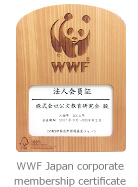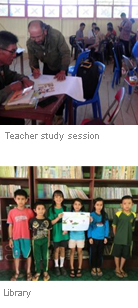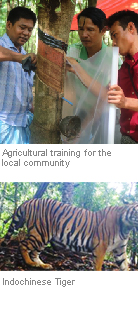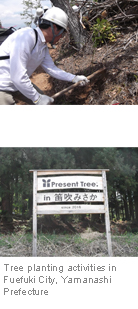Environmental Preservation with External Partners
Kumon Forest Foundation
The Kumon Group has made donations to various environmental organizations. In 2014 we established the Kumon Forest Foundation and built a system to provide our continuous support to these organizations dedicated to environmental preservation.
The Kumon Group uses a great amount of paper for printing worksheets and other materials. Therefore, we have been focusing on preventing the waste of paper. Staff have united in their efforts to use environmentally friendly paper, to reduce the use of paper as much as possible, and to increase the amount of paper we put out for recycling.
From now on, we will also strive for the reduction of our own environmental burden and, by promoting forest resource preservation with external partners through the Kumon Forest Foundation, we will continue to make contributions to the preservation of the global environment and the realization of a sustainable society.
Support for WWF Japan forest preservation activities

Through the Kumon Forest Foundation, the Kumon Group started to give our support to WWF Japan in 2014. WWF Japan is a member of the WWF Network, which is an organization for global environmental preservation operating in over 100 countries worldwide.
The WWF was established in Switzerland in 1961. Its mission is to protect biodiversity around the globe and to reduce the human burden on nature and wildlife. Forest preservation is one of them.
In addition to fieldwork, such as surveying and protecting rare species and reforestation through tree planting, WWF Japan works toward the goal of sustainable forest preservation by supporting local communities and the responsible purchasing of raw materials in Japan. It also conducts promotional and educational activities through the development of environmental educational programs and the organization of seminars and other events related to the environment.
WWF Japan supports forest preservation activities worldwide through its global network and also works on environmental education. Through education, Kumon also aims to make contributions to local communities and countries around the globe. Therefore, since we understand their activities, we also decided to support WWF Japan.
1. ESD Activities on Borneo Island
2. Forest preservation in the Mekong region
Participation in Reforestation Activities through the Tree as a Present
All Instructors in Japan submit reports via the Center system and they order worksheets and items via the internet as part of the effort by the Kumon Institute of Education. We have set up a system where Instructors are given “Green Points” in this process. The Green Points that are earned can be donated to the NPO Environmental Relations at a rate of 1 Green Point = 1 yen. This NPO is engaged in tree planting activities called the “Present Tree.”
A total of 1 million yen, including 490,000 yen contributed by Instructors, was donated in 2019 for tree planting activities in Fuefuki City, Yamanashi Prefecture, which is located to the east of the Kofu basin.
The forest in Fuefuki City has suffered damaged in recent years from insects and proper maintenance of the forest has not been possible due to a lack of personnel available to do this job. This has led to the decay of the Japanese red pine planted forest. Trees in the Japanese red pine planted forest that had undergone insect damage were cut down, tree species conversion was carried out, and local growth deciduous broad-leaved trees were planted. Staff members also participated in the tree planting activities. The goal is to create a local forest with rich biodiversity. This time 250 trees were planted. Over the past seven years a total of 2,491 tree saplings were planted. Together with the Instructors of the 16,200 Centers nationwide we will continue our efforts to reduce paper usage through our Green Points activities and we will participate in the forest preservation activities via the tree as a present.
- Contribution to Developing Countries
- Introduction of Kumon Method study into BRAC schools
in Bangladesh, contribution to achieving SDGs
Kumon's
Environmental
Activities
- Environmental
Management of
the Kumon Group - 2019 Activities and
Environmental Data - Environmental
Communication - Kumon's Environmental
Activities Spreading
throughout the World - Environmental Preservation with External Partners
- Contribution to Developing Countries


